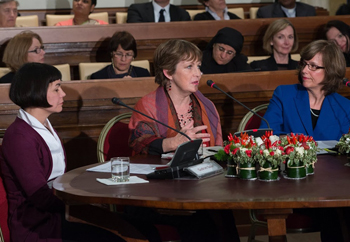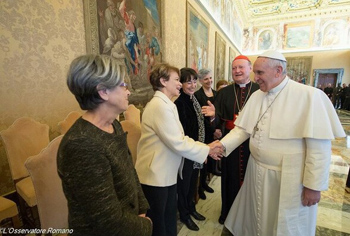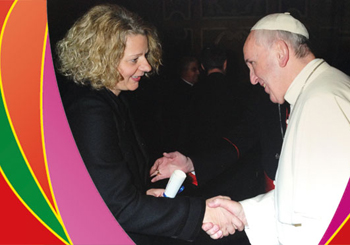Feminism
 |
 |
 |
 |
 |
 |
 |
Vatican Hosts Feminist Conference
This weekend the Vatican formally hosted one of Britain’s most virulently pro-abortion and pro-homosexual writers, as well as the head of an American organization promoting female ordination, at an officially sanctioned event inside Vatican City walls. Organizers spoke to Vatican Radio as well as the secular press, praising the new atmosphere within the Church’s leadership that made the conference possible.
As part of the Vatican’s official observance of International Women’s Day, this Sunday saw two events, one brought in from outside and the other organized by the Pontifical Council for Culture. The latter conference has come under public criticism for its “ham-fisted,” “tone-deaf,” “uncatholic,” and feminist-inspired approach to “Women’s Cultures.”
 The presence of the outside-organized event held inside the Vatican is being forthrightly hailed by organizers and the secular media as feminist victory over the traditional stance of the Church.
The presence of the outside-organized event held inside the Vatican is being forthrightly hailed by organizers and the secular media as feminist victory over the traditional stance of the Church.
Among the organizers and speakers were Deborah Rose-Milavec, one of the US’s most prominent agitators for female ordination, and Tina Beattie, a British feminist academic notorious for her advocacy for abortion, homosexual relations, and “gay marriage,” and who once compared the Catholic Mass to homosexual sex.
Beattie is the Director of the Digby Stuart Research Centre for Religion, Society and Human Flourishing at the University of Roehampton in London. Her extreme and anti-Catholic positions on abortion and sexuality prompted Bishop Declan Lang of the English Diocese of Clifton to cancel a scheduled lecture in 2012. She continues to write regularly for the UK’s far-left Catholic magazine The Tablet.
The organizer of the “storytelling event,” Voices of Faith, told the New York Times that holding the seminar on Vatican soil was a “hard-fought victory.” Chantal Götz of the Swiss Fidel Götz Foundation, said, “It becomes all the more symbolic when it’s inside the Vatican. It’s a step ahead.”
Götz suggested that the conference participants could form a “de facto think tank” for the pope. “If the pope needs advice, there are women who can provide it,” she said.
In an interview with Vatican Radio, Götz highlighted the presence at the conference of a nun who works with women in the parts of the Middle East under threat from the Islamist supremacist group ISIS. She did not, however, mention the presence of Tina Beattie or Deborah Rose-Milavec, and the interviewer did not bring up the presence among the seminar’s speakers of Gudrun Sailer, who has worked for the German section of Vatican Radio since 2003.
Deborah Rose-Milavec, a member of the Voices of Faith advisory board and head of the US group FutureChurch, which campaigns mainly for “women priests,” echoed the suggestion that the seminar could help develop policy for the Church.
On the website of Voices of Faith, Rose-Milavec said the seminar “could be a key agent in providing Pope Francis and others in leadership with both the vision and tools necessary to carry out his desire for a more incisive female presence in the Church.”

 “This would benefit all men and women but particularly women who are poor and powerless and who have been left behind economically, socially and politically,” she added.
“This would benefit all men and women but particularly women who are poor and powerless and who have been left behind economically, socially and politically,” she added.
Despite the single-issue focus of Rose-Milavec’s group, Goetz denied that the seminar aimed at “changing Church policy or doctrine.” To Vatican Radio she said, “We want just to highlight the different experiences of Catholic women and …put more focus on what they are doing for the poor and marginalized.”
“Pope Francis is saying we [women] should take more initiative in general on things and this is what we are trying to do.” “We are proud,” she said, that the seminar was invited to be held within the Vatican.
Joshua McElwee, a journalist with the far-left US paper National Catholic Reporter, said the meeting “saw a remarkably open and frank discussion among women about the limits on their participation in church structures.”
McElwee noted that it “may have been the first such public conversation ever to take place at the center of the Catholic hierarchy.” Using language comparable to that of the feminist “womenpriests” movement, he said the topics discussed included “the need for the church to practice what it preaches about full equality between men and women, to include women in every level of decision-making, and to use inclusive language in its worship.”
He remarked that while the topic of “women’s ordination” was “only discussed tangentially,” nevertheless the speakers “addressed the jarring lack of women in ministry in the church and in leadership positions in the Catholic hierarchy.” He quotes Vatican Radio’s Gudrun Sailer, who said, “It’s about recognizing, realizing that excluding women from the church [does] not conform to the Gospel. It’s not what the Gospel wants.”
The internal event, sponsored by the Vatican’s own Pontifical Council for Culture, while having a less radical agenda, was still criticized for kow-towing to feminist paradigms. Critics expressed concern that the agenda for the meeting contained the jargon-heavy language of academic feminism but little that would mark this officially sponsored Vatican event as Catholic.
Topics included, “Between equality and difference: the quest for an equilibrium,” “‘Generativity’ as a symbolic code,” “The female body: between culture and biology,” and “Women and religion: flight or new forms of participation in the life of the Church?” None of the materials for either conference contained a single reference to the Virgin Mary or the female saints or doctors of the Church.
 After pulling a video promoting the event in early February that was blasted on Twitter by hundreds of viewers from all sides of the Catholic political divide, the Council posted a photo of a headless, legless and armless statue, bound with ropes. When criticized again for this photo, which many compared with the pornographic film 50 Shades of Grey, the Council posted a note saying that although they acknowledged the criticisms, Cardinal Gianfranco Ravasi had personally decided the photo would stay. The photo, and the note, have since been removed.
After pulling a video promoting the event in early February that was blasted on Twitter by hundreds of viewers from all sides of the Catholic political divide, the Council posted a photo of a headless, legless and armless statue, bound with ropes. When criticized again for this photo, which many compared with the pornographic film 50 Shades of Grey, the Council posted a note saying that although they acknowledged the criticisms, Cardinal Gianfranco Ravasi had personally decided the photo would stay. The photo, and the note, have since been removed.
The ongoing close partnership between certain factions within the Vatican and the extreme and blatantly anti-Catholic feminist left has been raising controversy for decades. Some have responded to this latest salvo by saying the Catholic Church is flatly acting against its own interests with its ongoing flirtation with heavily secularist, and politically-charged leftist feminist agenda.
International Women’s Day, a holiday started by the Soviet revolutionaries in the early 20th century, has become an annual showcase for atheistic political feminism in many transnational organizations like the UN and the EU.
Deborah Gyapong, a widely read Canadian freelance Catholic journalist and blogger, spoke to LifeSiteNews of the “partisan agenda” of this weekend’s dual conferences, asking what it had to do with the Catholic religion.
Gyapong said that “even to talk about ‘gender equality’ is to import alien, Marxist inspired ideas into the conversation.” “It means that these views are calling the shots of the conversation, or to use another metaphor, establishing the playing field,” she said.
Gyapong added that while the motive “may have been dialog and inviting diverse points of view,” the lack of balance created a message that these key issues are up for grabs in the Church. She asked where the “clear and articulate” voices defending the Church’s teaching were.
“Would the Vatican hold a conference on the Trinity and invite people who say they are Catholics but who deny there are three Persons in one God?” Gyapong asked. “Women who see the hierarchy merely in terms of power relations and clericalism are unlikely to be less clericalist were they put into positions of power.”
“There are some beautiful, faithful, holy women religious, women theologians, women bioethicists who are not whining and complaining about gender equity,” she added. “As a journalist who has regular contact with cardinals and archbishops, I have never felt marginalized or treated with disrespect.”

Posted March 18, 2015
This article was first published at
Life Site News on March 11, 2015
As part of the Vatican’s official observance of International Women’s Day, this Sunday saw two events, one brought in from outside and the other organized by the Pontifical Council for Culture. The latter conference has come under public criticism for its “ham-fisted,” “tone-deaf,” “uncatholic,” and feminist-inspired approach to “Women’s Cultures.”

Known feminists Gudrun Sailer, Tina Beattie and Rose-Milavec were featured speakers
Among the organizers and speakers were Deborah Rose-Milavec, one of the US’s most prominent agitators for female ordination, and Tina Beattie, a British feminist academic notorious for her advocacy for abortion, homosexual relations, and “gay marriage,” and who once compared the Catholic Mass to homosexual sex.
Beattie is the Director of the Digby Stuart Research Centre for Religion, Society and Human Flourishing at the University of Roehampton in London. Her extreme and anti-Catholic positions on abortion and sexuality prompted Bishop Declan Lang of the English Diocese of Clifton to cancel a scheduled lecture in 2012. She continues to write regularly for the UK’s far-left Catholic magazine The Tablet.
The organizer of the “storytelling event,” Voices of Faith, told the New York Times that holding the seminar on Vatican soil was a “hard-fought victory.” Chantal Götz of the Swiss Fidel Götz Foundation, said, “It becomes all the more symbolic when it’s inside the Vatican. It’s a step ahead.”
Götz suggested that the conference participants could form a “de facto think tank” for the pope. “If the pope needs advice, there are women who can provide it,” she said.
In an interview with Vatican Radio, Götz highlighted the presence at the conference of a nun who works with women in the parts of the Middle East under threat from the Islamist supremacist group ISIS. She did not, however, mention the presence of Tina Beattie or Deborah Rose-Milavec, and the interviewer did not bring up the presence among the seminar’s speakers of Gudrun Sailer, who has worked for the German section of Vatican Radio since 2003.
Deborah Rose-Milavec, a member of the Voices of Faith advisory board and head of the US group FutureChurch, which campaigns mainly for “women priests,” echoed the suggestion that the seminar could help develop policy for the Church.
On the website of Voices of Faith, Rose-Milavec said the seminar “could be a key agent in providing Pope Francis and others in leadership with both the vision and tools necessary to carry out his desire for a more incisive female presence in the Church.”

Above, Francis greats the participants of the Conference; below, bowing to Chantal Götz

Despite the single-issue focus of Rose-Milavec’s group, Goetz denied that the seminar aimed at “changing Church policy or doctrine.” To Vatican Radio she said, “We want just to highlight the different experiences of Catholic women and …put more focus on what they are doing for the poor and marginalized.”
“Pope Francis is saying we [women] should take more initiative in general on things and this is what we are trying to do.” “We are proud,” she said, that the seminar was invited to be held within the Vatican.
Joshua McElwee, a journalist with the far-left US paper National Catholic Reporter, said the meeting “saw a remarkably open and frank discussion among women about the limits on their participation in church structures.”
McElwee noted that it “may have been the first such public conversation ever to take place at the center of the Catholic hierarchy.” Using language comparable to that of the feminist “womenpriests” movement, he said the topics discussed included “the need for the church to practice what it preaches about full equality between men and women, to include women in every level of decision-making, and to use inclusive language in its worship.”
He remarked that while the topic of “women’s ordination” was “only discussed tangentially,” nevertheless the speakers “addressed the jarring lack of women in ministry in the church and in leadership positions in the Catholic hierarchy.” He quotes Vatican Radio’s Gudrun Sailer, who said, “It’s about recognizing, realizing that excluding women from the church [does] not conform to the Gospel. It’s not what the Gospel wants.”
The internal event, sponsored by the Vatican’s own Pontifical Council for Culture, while having a less radical agenda, was still criticized for kow-towing to feminist paradigms. Critics expressed concern that the agenda for the meeting contained the jargon-heavy language of academic feminism but little that would mark this officially sponsored Vatican event as Catholic.
Topics included, “Between equality and difference: the quest for an equilibrium,” “‘Generativity’ as a symbolic code,” “The female body: between culture and biology,” and “Women and religion: flight or new forms of participation in the life of the Church?” None of the materials for either conference contained a single reference to the Virgin Mary or the female saints or doctors of the Church.

The ongoing close partnership between certain factions within the Vatican and the extreme and blatantly anti-Catholic feminist left has been raising controversy for decades. Some have responded to this latest salvo by saying the Catholic Church is flatly acting against its own interests with its ongoing flirtation with heavily secularist, and politically-charged leftist feminist agenda.
International Women’s Day, a holiday started by the Soviet revolutionaries in the early 20th century, has become an annual showcase for atheistic political feminism in many transnational organizations like the UN and the EU.
Deborah Gyapong, a widely read Canadian freelance Catholic journalist and blogger, spoke to LifeSiteNews of the “partisan agenda” of this weekend’s dual conferences, asking what it had to do with the Catholic religion.
Gyapong said that “even to talk about ‘gender equality’ is to import alien, Marxist inspired ideas into the conversation.” “It means that these views are calling the shots of the conversation, or to use another metaphor, establishing the playing field,” she said.
Gyapong added that while the motive “may have been dialog and inviting diverse points of view,” the lack of balance created a message that these key issues are up for grabs in the Church. She asked where the “clear and articulate” voices defending the Church’s teaching were.
“Would the Vatican hold a conference on the Trinity and invite people who say they are Catholics but who deny there are three Persons in one God?” Gyapong asked. “Women who see the hierarchy merely in terms of power relations and clericalism are unlikely to be less clericalist were they put into positions of power.”
“There are some beautiful, faithful, holy women religious, women theologians, women bioethicists who are not whining and complaining about gender equity,” she added. “As a journalist who has regular contact with cardinals and archbishops, I have never felt marginalized or treated with disrespect.”

Posted March 18, 2015
This article was first published at
Life Site News on March 11, 2015
______________________
______________________












